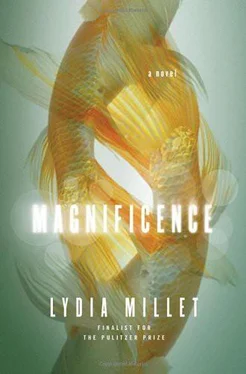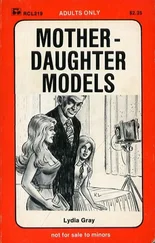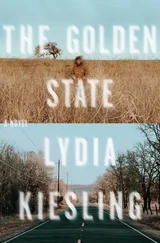After a few more minutes of wheedling she was able to steer Angela back into the kitchen and persuade her to accept a glass of iced tea. Quiet in the background, she slipped out the door while the other two were talking — fled down the walk gratefully in her slept-in clothes, her teeth gritty and unbrushed.
•
Construction workers came and moved the large pieces of furniture from the walls marked by the architect. When they had gone, dark, massive old wardrobes stood anchorless in the center of rooms.
It bothered her. The investigation had to be finished quickly or she would grow restless at the disorder. But when she called his office the architect was busy with real work , he said testily. He pawned her off on a junior associate who could come by in his stead.
The associate was a young recent graduate named Leigh, her hair pulled back in a tight platinum-blond ponytail, wearing the same trendy horn-rimmed glasses favored by her colleague. Susan admired her self-possession and wondered if all architects had this — a punctilious, almost rigorous and pared-down sense of style, clothing with clean lines and expensive labels. Leigh showed no interest in the mounts, only the house itself — as though the animals were not there, as though she saw right through them.
Susan could tell she was less expert than the older guy but she seemed to know enough for the purpose. She rapped on walls and moved a small yellow stud finder over their surfaces, Susan watching as its green light flashed on and off again.
“Nothing there,” she said in the first room.
“Nope, nothing,” she said in the second.
“My guess would be crawl space,” she said in the third. “Not enough room for stairs.”
“Sorry, no,” she said in the last room.
Susan was disappointed.
Only then, resigned to a nonevent and walking the architect girl to the door, did she remember the slab.
“Wait,” she said excitedly, and stopped. “There’s this one place in the yard — it’s not that near the house, actually, it’s in the backyard, way back there in the fir grove — but when I first moved in, we were doing some garden work and we found it. It’s just a piece of concrete sunk into the ground. You don’t really notice it, normally. He said there might have been a root cellar under there once, something like that. I mean, it’s just a slab. Cement or whatever. With grass growing over the edges. But can you quickly take a look?”
Leigh followed Susan out the service entrance and around to the back, where they picked their way down the flagstone paths toward the copse at the rear of the property. The further they went the more discouraged she felt: it was too far from the house. It was unlikely to be connected.
A few steps into the fir trees they ducked under some boughs, crunched over a sparse litter of cones and then stood over the slab: overgrown, concrete, about three feet square.
Almost nothing.
“Enh,” said the architect girl, and shrugged. She poked at the slab with the smooth toe of her pump. “It doesn’t look like much to me.”
•
The intercom buzzed a little past midnight. She looked out the window of her new bedroom — it faced the crescent drive instead of the backyard — and saw a taxi waiting at the front gate.
She was hoping it was Casey, and she took the wide stairs quickly, lightly, two at a time. But when she pressed the button to talk to the driver he said, “I got a Angela here. Angela Stern.”
She almost said Oh no right then. But instead she sighed, buzzed open the gate and went out front to meet them.
“Does she know where you are?” she asked Angela, as soon as she stepped from the taxi.
It could mean Merced’s job, she was thinking.
“She fell asleep,” Angela said.
“We have to call. She’ll be worried sick by now.”
Angela walked slowly, peering down through the dark at her footing as the taxi’s headlights swept back. She was wearing a long winter coat, a coat she’d never have a use for in L.A., over a sheer lacy nightgown.
“So what went wrong?” asked Susan, a hand on her arm to steer. As they drew near the house again the motion sensors were triggered and the outside lights flicked on.
“It wasn’t safe. It was unsafe ,” said Angela, and shook her head.
“Unsafe.”
“What if she stepped on you,” said Angela. “Those shoes — those shoes would be like daggers. They could stab me.”
“Uh-huh,” said Susan.
It took her a moment to register the words. And then she found Angela was standing there stricken. Her face looked white.
“I’m so sorry ,” she said, exactly as a person might who wasn’t insane at all. “I shouldn’t have said that.”
“Don’t worry. It’s all right,” said Susan.
Inside she sat Angela down in the kitchen, gave her a glass of water and called the apartment, where Merced picked up the phone right away.
“She’ll stay with me,” Susan told her, resigned. “She’ll stay till Vera gets back. So have them call me as soon as that happens. Would you?”
She looked over at Angela, who was sitting very straight on her kitchen chair under a fish and holding her water glass carefully, with two hands. She put her to bed in North American Birds.

When the children returned, Angela was still there. They showed up at the big house one evening around dusk, while Susan and Jim and Angela were eating Thai on the patio beside the pool — though Angela was not eating. After the food arrived she’d decided she distrusted food of any “ethnicity” and had requested instead a Tom Collins.
Casey was brown from the sun and T. wore faded jeans. The three-legged dog loped along beside them.
“Oh, dears, dears!” called Angela joyfully. “How was the Mexican wedding?”
Susan rose as they approached the table, rose and put down her napkin.
“Good,” said T., and rested a hand lightly on Casey’s shoulder. “It was good.”
She wanted to show she was happy about the wedding news. And for the most part she was, or she would be when she assimilated the information — she felt a kind of rising anticipation on Casey’s behalf — but there was also petty confusion. Her pride was injured as much as her feelings. She would have been grateful for anything — the most nominal warning, the most casual tip of a hat.
“I didn’t tell you because I didn’t know,” said Casey.
They’d gone to get a bottle of white wine from the kitchen. Susan didn’t keep champagne in the house, so it would have to serve.
“But Angela did,” she said, rummaging in a drawer for a corkscrew and trying to contain the seed of resentment. No whining; keep it pure and simple, be remembered well.
“Oh yeah?” asked Casey. Give her credit: it sounded like real surprise.
“She told me you were on your honeymoon,” said Susan.
“Huh. Not exactly,” said Casey. “In the first place, I only went along for the ride. At the last minute. I wasn’t planning to. It was Baja — the Sea of Cortez. A whale stranding.”
“A whale stranding?” asked Susan, looking up from the wine.
“A mass stranding. There were over twenty of them. Beaked whales, which is a kind that dives deep, I guess? They look like dolphins to me, they have those kind of long noses. Anyway the biologists inspected some of the dead ones and said they had these hemorrhages around the ears. They think navy sonar caused them. You know, the navy does this sonar in the ocean? It’s for detecting diesel submarines, or something. So anyway the whale guys think the sound waves hurt whale brains. They get confused or they’re in pain and it disorients them and then they beach themselves. They lie there baking in the sun and dying. It’s one of the worst things I’ve seen. You wouldn’t believe the smell.”
Читать дальше













